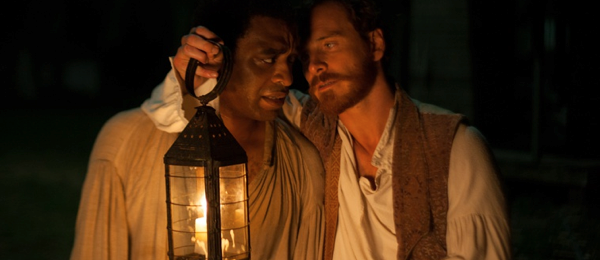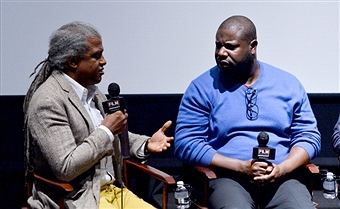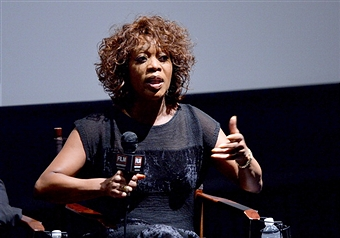Following a standing ovation at the Film Independent Members-only screening of 12 Years a Slave, the third astonishing feature from British director Steve McQueen (Hunger, Shame), Elvis Mitchell welcomed McQueen and co-stars Chiwetel Ejiofor, Lupita Nyong’o and Alfre Woodard to the stage. When the subject of the source material came up during the Q&A, it sparked a heated conversation about the significance of the text and its preservation. McQueen’s wife introduced him to 12 Years a Slave when he was conducting research for a project. His initial response to reading the book was astonishment and anger. “I just didn’t understand why I didn’t know this book. I was angry and I was upset with myself,” he said. “I thought it was like reading Anne Frank for the first time, like going to another world.”
The film, being released today, is based on a memoir that was written 160 years ago. In the pre-Civil War United States, accomplished and respected musician Solomon Northup (Chiwetel Ejiofor), a free black man from upstate New York, is abducted and sold into slavery. Facing cruelty (personified by a sadistic slave owner, played by Michael Fassbender) as well as unexpected kindnesses, Solomon struggles not only to stay alive, but to retain his dignity and sanity. Hailed by the New Yorker as “easily the greatest feature film ever made about American slavery,” it’s an unflinching, unforgettable story. With an omnipresent anxiety that saturates every minute of the film, McQueen effectively draws viewers inside Solomon’s internal torment by creating a layered sensorial depiction of American slavery. The industrial sounds of the riverboat that carries Solomon to his first hellish plantation are heard later in the film, during moments of terror, reminding us of the psychological trauma his journey has inflicted on him. It is an immersive narrative and a haunting one.
Elvis Mitchell interviews director Steve McQueen
Elvis Mitchell asked McQueen why he thought the memoir, a best-seller when it was first published in 1853, remains unknown to most people today, to which McQueen responded, “It’s shocking, shocking, shocking that such an amazing book… look, this book should be in every single school in every syllabus in every curriculum in America, and in the world! I mean, how is it not? Why wasn’t it? It’s a massive f—ing question mark.” Mitchell asked McQueen’s thoughts on people making assumptions about the violence in the movie prior to viewing it. “In this movie, there are 6 moments of violence in a movie which is 2 hours and 14 minutes long,” the director responded. “I mean, you go to a thriller and someone’s being shot in the head every four seconds.”
Alfre Woodard
Of course, the context is different when it comes to making an honest film about American slavery. “Either you’re making a movie about slavery or you’re not. So, within that context, there’s going to be psychological slavery and there’s going to be physical acts of slavery, as in abuse.” The conversation concluded with Alfre Woodard encouraging viewers to have a dialogue about the material with one another, saying, “yes, it’s tough. It’s brutal and it’s beautiful. Just like life always is. But it’s essential, and you will feel a certain sense of wholeness by sharing it and talking about it.” By Lee Jameson / Film Education Coordinator


